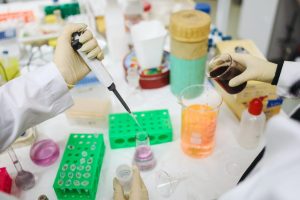What does a chemical engineer do? How can they use their knowledge in the manufacturing industry? Last Wednesday, October 14, the PRPDG team was able to interview Ing. Arturo García de la Noceda, president of the Chemical Engineers Institute of the CIAPR, about all the different tasks and responsibilities that are part of a chemical engineer’s job.
Q. What does a chemical engineer do, and how is this different from other engineers?
A. “In essence, a chemical engineer analyzes materials and evaluates how he/she can transform them in order to give them some type of use for humans. I take prime matter, and if I want to obtain a product X, then I have to pass it through different processes such as reactions, separations… and take all of the steps in order to obtain the final product that the general public needs. These products can be, for example, medicines or food that people need to continue their daily life”.

Q. In which professions or industries do we generally see chemical engineers?
A. “You could typically associate chemical engineers with petrochemicals, pharmaceuticals… but obviously nowadays they’ve diversified and expanded to the service industry, validation companies, cleaning companies, government agency positions, etc. We’re now involved in the food, drink, and medicine industries, while also developing other products that are needed for human consumption”.
Q. What do you think of the manufacturing industry on the island, in general?
A. “Because of the elimination of section 936 of the Federal Income Code, all those factories, pharmaceuticals, petrochemicals, clothing manufacturers, amongst others, have been deeply affected because they don’t have these incentives and tax credits. During the 70s, 80s, and even 90s, there was a resurgence of all these industries that gave jobs to a lot of people, technical jobs that were very well paid. They had sustainable life conditions, but with the elimination of these tax credits, those factories have been displaced to other countries, and there’s been a consolidation of operations. In Puerto Rico, many of these pharmaceuticals and companies have had to reinvent themselves to keep producing and surviving. Since those factories have been closing, we have lost our valuable human capital, highly capable and technically trained personnel that have been forced to move elsewhere in order to get job opportunities. Now we see that the elimination of this section was a mistake because the human resource we had is now gone, just when demand is rising again. That’s our biggest issue right now”.
Q. In your opinion, why is it essential to have a chemical engineer in the manufacturing industry?
A. “You’re going to continue consuming products, and getting sick as well, and so we need someone who will prepare those medicines you’re going to take. You’re going to keep buying food from the supermarket and buying clothes at your favorite stores… so life continues. Engineers will always be necessary so that all the products that you consume in your daily life are ready to be bought”.
Q. Do you have any suggestions for students about to graduate from chemical engineering?
A. “An engineer needs to know how to communicate effectively, not only in the verbal aspect, but in the written as well. Many universities are offering technical writing courses, and I think that’s essential for any engineer, to be able to correctly express everything they’re thinking. There are also management courses. Nowadays, engineers from all areas of expertise function mainly as project managers, more so than working in the specific field they studied. Because of this, they should all have those skills to be able to work efficiently”.

